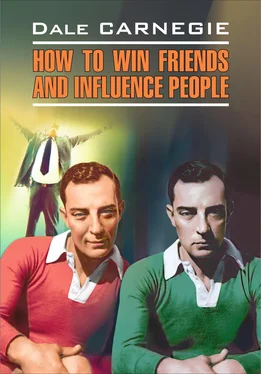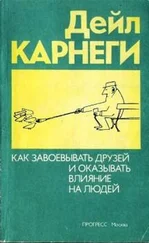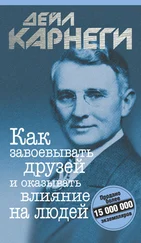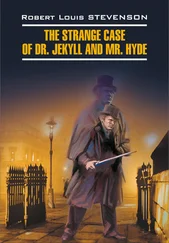Upon returning to the airport, he asked to see the mechanic who had serviced his airplane. The young man was sick with the agony of his mistake. Tears streamed down his face as Hoover approached. He had just caused the loss of a very expensive plane and could have caused the loss of three lives as well.
You can imagine Hoover’s anger. One could anticipate the tongue-lashing that this proud and precise pilot would unleash for that carelessness. But Hoover didn’t scold the mechanic; he didn’t even criticize him. Instead, he put his big arm around the man’s shoulder and said, “To show you I’m sure that you’ll never do this again, I want you to service my F-51 tomorrow.”
Often parents are tempted to criticize their children. You would expect me to say “don’t.” But I will not. I am merely going to say, “Before you criticize them, read one of the classics of American journalism, ‘Father Forgets.’” It originally appeared as an editorial in the People’s Home Journal. We are reprinting it here with the author’s permission, as condensed in the Reader’s Digest:
“Father Forgets” is one of those little pieces which – dashed off in a moment of sincere feeling – strikes an echoing chord in so many readers as to become a perennial reprint favorite. Since its first appearance, “Father Forgets” has been reproduced, writes the author, W. Livingston Larned, “in hundreds of magazines and house organs, and in newspapers the country over. It has been reprinted almost as extensively in many foreign languages. I have given personal permission to thousands who wished to read it from school, church, and lecture platforms. It has been ‘on the air’ on countless occasions and programs. Oddly enough, college periodicals have used it, and high-school magazines. Sometimes a little piece seems mysteriously to ‘click’. This one certainly did.”
Father forgets
W. Livingston Larned
Listen, son: I am saying this as you lie asleep, one little paw crumpled under your cheek and the blond curls stickily wet on your damp forehead. I have stolen into your room alone. Just a few minutes ago, as I sat reading my paper in the library, a stifling wave of remorse swept over me. Guiltily I came to your bedside.
There are the things I was thinking, son: I had been cross to you. I scolded you as you were dressing for school because you gave your face merely a dab with a towel. I took you to task for not cleaning your shoes. I called out angrily when you threw some of your things on the floor.
At breakfast I found fault, too. You spilled things. You gulped down your food. You put your elbows on the table. You spread butter too thick on your bread. And as you started off to play and I made for my train, you turned and waved a hand and called, “Goodbye, Daddy!” and I frowned, and said in reply, “Hold your shoulders back! [10]”
Then it began all over again in the late afternoon. As I came up the road I spied you, down on your knees, playing marbles. There were holes in your stockings. I humiliated you before your boyfriends by marching you ahead of me to the house. Stockings were expensive – and if you had to buy them you would be more careful! Imagine that, son, from a father!
Do you remember, later, when I was reading in the library, how you came in timidly, with a sort of hurt look in your eyes? When I glanced up over my paper, impatient at the interruption, you hesitated at the door. “What is it you want?” I snapped.
You said nothing, but ran across in one tempestuous plunge, and threw your arms around my neck and kissed me, and your small arms tightened with an affection that God had set blooming in your heart and which even neglect could not wither. And then you were gone, pattering up the stairs.
Well, son, it was shortly afterwards that my paper slipped from my hands and a terrible sickening fear came over me. What has habit been doing to me? The habit of finding fault, of reprimanding – this was my reward to you for being a boy. It was not that I did not love you; it was that I expected too much of youth. I was measuring you by the yardstick of my own years.
And there was so much that was good and fine and true in your character. The little heart of you was as big as the dawn itself over the wide hills. This was shown by your spontaneous impulse to rush in and kiss me good night. Nothing else matters tonight, son. I have come to your bedside in the darkness, and I have knelt there, ashamed!
It is a feeble atonement; I know you would not understand these things if I told them to you during your waking hours. But tomorrow I will be a real daddy! I will chum with you, and suffer when you suffer, and laugh when you laugh. 1 will bite my tongue when impatient words come. I will keep saying as if it were a ritual: “He is nothing but a boy – a little boy!”
I am afraid I have visualized you as a man. Yet as I see you now, son, crumpled and weary in your cot, I see that you are still a baby. Yesterday you were in your mother’s arms, your head on her shoulder. I have asked too much, too much.
Instead of condemning people, let’s try to understand them. Let’s try to figure out why they do what they do. That’s a lot more profitable and intriguing than criticism; and it breeds sympathy, tolerance and kindness. “To know all is to forgive all.”
As Dr. Johnson said: “God himself, sir, does not propose to judge man until the end of his days.”
Why should you and I?
PRINCIPLE 1
Don’t criticize, condemn or complain.
Questions
1) What happened in New York on May 7, 1931?
2) Where did the criminal hide himself?
3) How did the police commissioner characterize “Two Gun” Crowley?
4) How did Crowley regard himself?
5) Why did Crowley kill the policeman when he was coming back from the necking party?
6) What punishment was Crowley sentenced to? What were Crowley’s last words?
7) Do notorious criminals such as “Two Gun” Crowley, Al Capone, and Dutch Schultz evaluate themselves right?
8) What was the secret of Lincoln’s success in dealing with people?
9) How did Lincoln handle people when he was a young lawyer?
10) Why was Lincoln challenged to fight a duel?
11) What invaluable lesson was Lincoln taught during the duel?
12) What letter did Lincoln write to general Meade? Why didn’t he send it?
13) What happened to the plane of Bob Hoover, a famous test pilot, when he was returning to his home in Los Angeles?
14) How did Bob Hoover behave when his mechanic filled the wrong fuel into his plane?
15) Do parents often tempt to criticize their children?
16) What does Dale Carnegie recommend to do if we want to change somebody?
17) What does Dale Carnegie say about criticism?
18) What does Carnegie recommend to do instead of condemning people?
19) What did Dr. Johnson say about judgement of people?
20) What is the first D. Carnegie’s principle?
21) Do you think you will use this principle in dealing with people?
II
The big secret of dealing with people
There is only one way under high heaven to get anybody to do anything. Did you ever stop to think of that? Yes, just one way. And that is by making the other person want to do it.
Remember, there is no other way.
Of course, you can make someone want to give you his watch by sticking a revolver in his ribs. You can make your employees give you cooperation – until your back is turned – by threatening to fire them. You can make a child do what you want it to do by a whip or a threat. But these crude methods have sharply undesirable repercussions.
Читать дальше
Конец ознакомительного отрывка
Купить книгу












